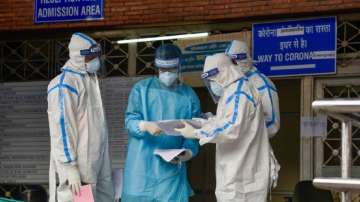The Delhi government has revised its 'COVID Response Plan' and will now enlist and screen for the novel coronavirus daily wagers, domestic helps, auto drivers and food suppliers, according to an official order issued on Wednesday. It will also enlist and screen people in high-risk groups (HRGs) -- those aged above 60 or having comorbid conditions -- through house-to-house surveys in containment zones, buffer zones and areas with isolated cases.
The city government revised its 'COVID Response Plan' following suggestions from the National Centre for Disease Control, Union Ministry of Health and Family Welfare and NITI Aayog in view of a significant number of cases being reported as isolated cases in Delhi.
Here's what will change in the modified plan
- Special Surveillance Groups (SSGs), including rickshaw pullers, auto drivers, taxi drivers, domestic helps, plumbers, electricians, carpenters, etc, and those who supply essentials, parcels and posts will be enlisted with the help of municipal corporations, transport department, resident welfare associations and police
- The Directorate General of Health Services (DGHS) has asked the districts to screen the SSGs. "Major points of conglomerations of SSGs in the districts should be compulsorily covered," it said in the order.
- If a positive case is found in the SSGs, the patient should be taken care of as per the COVID protocol. His/her workplace and home should be immediately disinfected followed by enhanced surveillance and aggressive contact tracing. The primary contacts in such cases should be traced and strictly quarantined for 15 days
- Points of the conglomeration of SSGs will be identified and mass disinfection exercise will be carried out on a regular basis at such spots
- The authorities have also called for organising an aggressive awareness programme and media campaign to popularise social distancing norms, hand hygiene and respiratory etiquettes in the SSGs
- All district administrations have also been asked to enlist and screen those aged above 60 or having comorbid conditions such as hypertension, diabetes and cancer
- The district administrations have been asked to regularly visit or contact all the enlisted cases to assess their medical condition and maintain proper medical records.
- The HRGs should be promptly isolated if their immediate contacts are found positive or symptomatic
- The District Surveillance Units have also been directed to make arrangements to collect detailed information about areas reporting isolated cases for over 28 days
- Enhance and effective contact tracing will be undertaken in such areas and completed within 72 hours
- House-to-house surveys will be conducted to detect cases of severe acute respiratory infection and influenza-like illnesses through Assess-Corona app
Also Read | Delhi records 2,033 coronavirus cases, 48 deaths in 24 hrs
Also Read | Delhi govt to provide free ration to PDS cardholders till November
Latest India News
